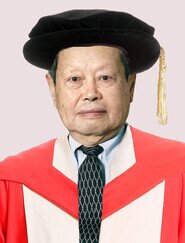Biography


Professor Chen-Ning Yang is a Nobel Laureate, a world-renowned theoretical physicist and an inspiration to generations of young scientists in China.
Professor Yang was born in Hefei, Anhui, China and holds a BSc from the National Southwestern Associated University (Lianda) (1942), an MSc from Tsinghua University (1944) and a PhD from the University of Chicago (1948). He joined the Institute for Advanced Study in Princeton, New Jersey in 1949, becoming a permanent member of the Institute in 1952, and full professor in 1955. In 1963, Princeton University Press published his textbook, Elementary Particles: A Short History of Some Discoveries in Atomic Physics.
In 1966, he joined Stony Brook University as Albert Einstein Professor of Physics and the first director of the newly founded Institute for Theoretical Physics, known today as the CN Yang Institute for Theoretical Physics. He is currently Emeritus Professor of Stony Brook University, Distinguished Professor-at-large at the Chinese University of Hong Kong, and Professor at Tsinghua University.
Professor Yang won the Nobel Prize in Physics in 1957, together with Professor Lee Tsung Dao, for the discovery of non-conservation of parity in weak interactions. He is also well known for his collaboration with Robert Mills in developing non-Abelian gauge theory, widely known as the Yang–Mills theory of 1954, which has become the foundation of the standard model of elementary particle interactions, and a research breakthrough that has reshaped the development of physics and modern geometry since the second half of the 20th century.
Professor Yang has received an array of international honours and awards including, inter alia, the Enrico Fermi Medal (1979), the Rumford Premium (1980), the Oppenheimer Memorial Plaque (1981), the US National Medal of Science (1986), the Benjamin Franklin Medal (1993), the Bower Award (1994), the Albert Einstein Medal (1995), the N Bogoliubov Prize (1996), the Lars Onsager Prize (1999), the Academicum Pontificium (2000), the King Faisal International Prize (2001) and the You Bring Charm to the World Award - Prize of Success for Life, China (2006). He has been conferred Honorary Degrees from over 20 universities worldwide.
In recognition of his contributions to academia and the world, the University has resolved to confer upon him the degree of Doctor of Science honoris causa.



